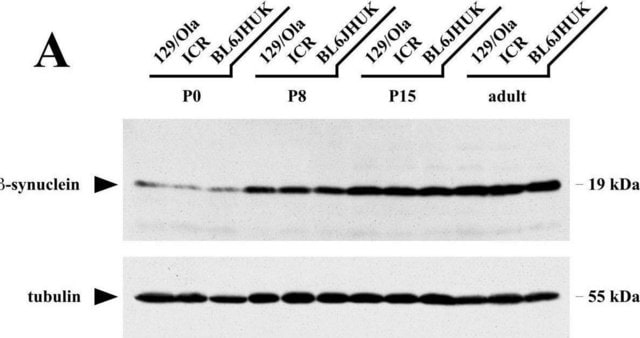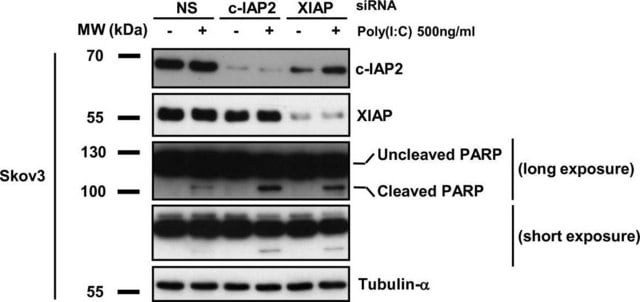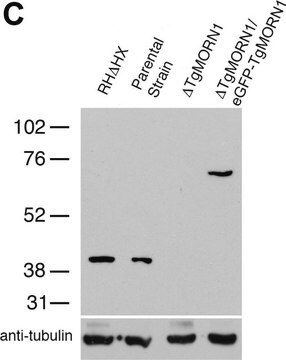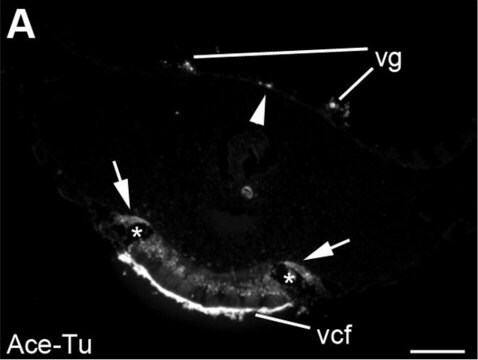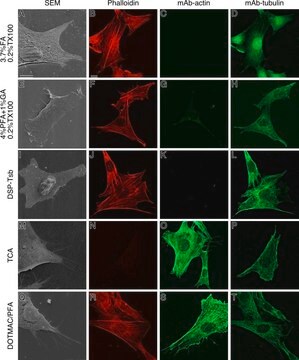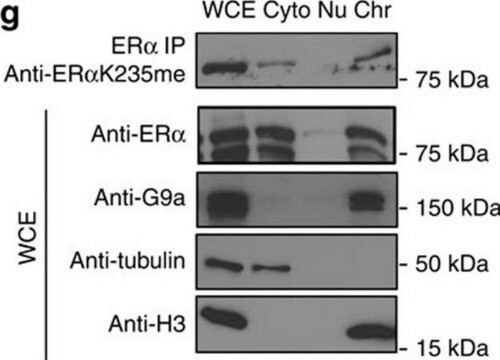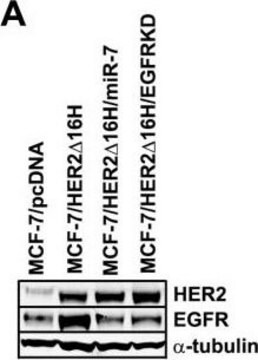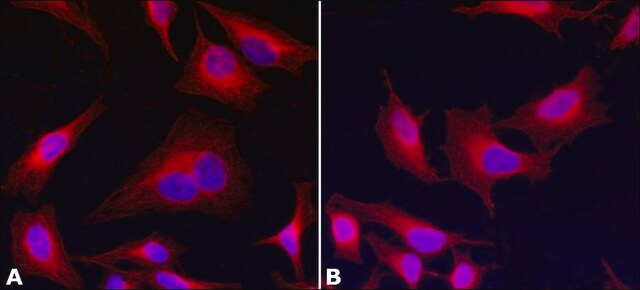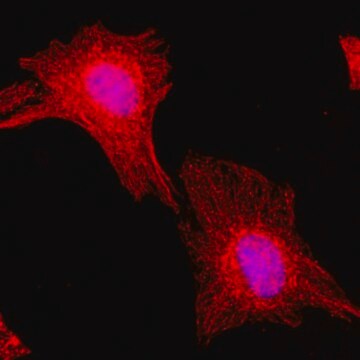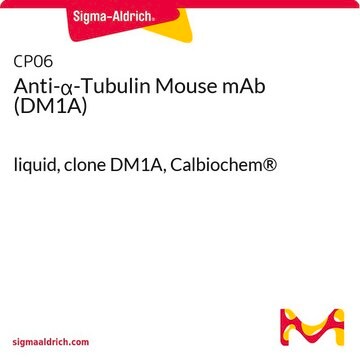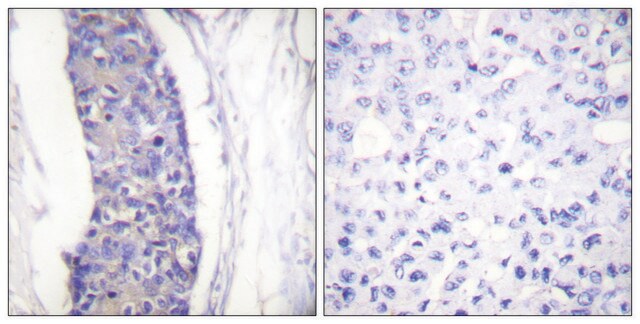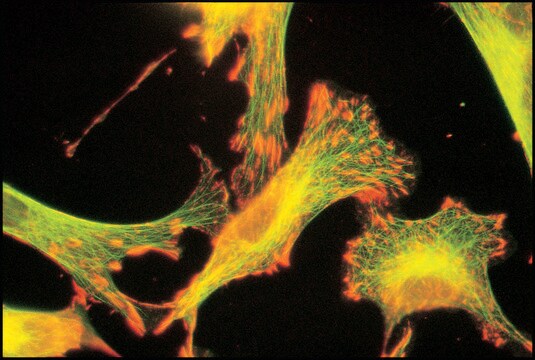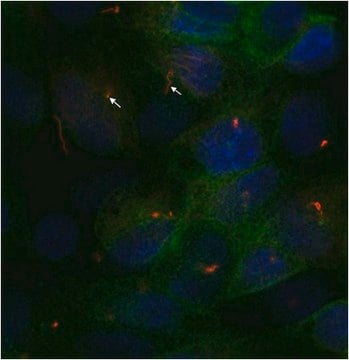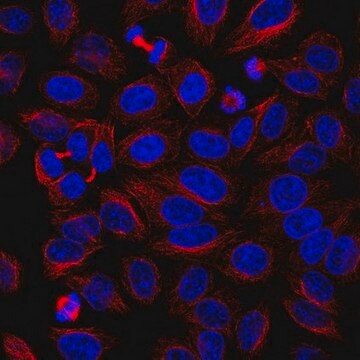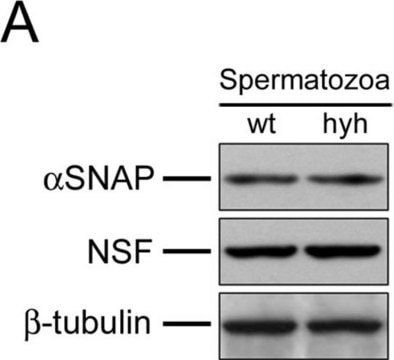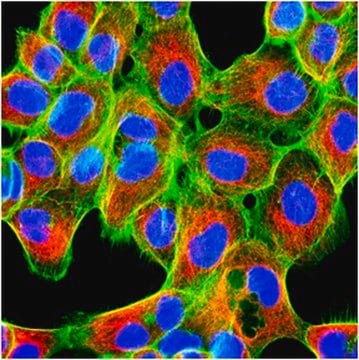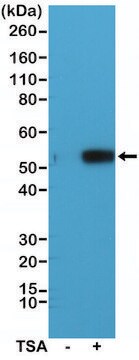T6199
Anti-TUBA4A (TUBA1) Antibody

mouse monoclonal, DM1A
Synonym(s):
Monoclonal Anti-α-Tubulin
About This Item
Recommended Products
Product Name
Anti-α-Tubulin antibody, Mouse monoclonal, clone DM1A, purified from hybridoma cell culture
biological source
mouse
Quality Level
conjugate
unconjugated
antibody form
purified immunoglobulin
antibody product type
primary antibodies
clone
DM1A, monoclonal
form
buffered aqueous solution
mol wt
antigen ~50 kDa
species reactivity
yeast, mouse, amphibian, human, rat, chicken, fungi, bovine
Looking for similar products? Visit Product Comparison Guide
Related Categories
General description
Tubulin is the major building block of microtubules. This intracellular, cylindrical, filamentous structure is present in almost all eukaryotic cells. Microtubules function as structural and mobile elements in mitosis, intracellular transport, flagellar movement, and the cytoskeleton. Tubulin is a heterodimer that consists of α-tubulin and β-tubulin. Both subunits have a molecular weight of approx. 50 kDa and share considerable homology. In addition to α- and β-tubulin, several other tubulins have been identified, bringing the number of distinct tubulin classes to seven. Most of these tubulins have distinct subcellular localization and an emerging diverse set of functions. Out of the seven different tubulins four new members of the tubulin family were identified recently, which consist of δ, ξ, η and ε-tubulin. η and ε-tubulins were discovered by database searches. Microtubular systems contain at least three α-tubulin isoforms. Two isoforms are coded by two α-tubulin genes, which are both transcribed and code for extremely similar proteins. The third isoform is generated by post-translational modification. At least three modifications of tubulin subunits have been described: the phosphorylation of β-tubulin from brain, the removal of the carboxy terminal tyrosine form a-tubulin in vertebrate tissues, and the acetylation of the amino group of lysine(s) in α-tubulin.
α -tubulin, also called tubulin α 4a (TUBA4A), is mapped to human chromosome 2q35.[1] The gene codes for a member of the α -tubulin family, and contains 448 amino acids.[1] α-subunit of tubulin has molecular weight of 50,000.
Monoclonal antibodies recognizing α-tubulin, together with monoclonal antibodies to other tubulin types (β, β-tubulin isotype I +II, β-tubulin isotype III, tyrosine tubulin, and the acetylated form of α-tubulin) provide a specific and useful tool in studying the intracellular distribution of tubulin and the static and dynamic aspects of cytoskeleton.
Specificity
Immunogen
Application
Biochem/physiol Actions
α-Tubulin or tubulin α 4A (TUBA4A) plays an essential role in cell growth and division. It is also implicated in various cellular processes, such as cell motility, signaling development and cell shape maintenance. Mutation in TUBA4A is associated with the development of various types of cancers, such as oral cancer, breast cancer, rectal cancer, lung cancer and prostate cancer. In addition, variation in the TUBA4A leads to sporadic amyotrophic lateral sclerosis (ALS).
Physical form
Preparation Note
Other Notes
Disclaimer
Not finding the right product?
Try our Product Selector Tool.
Storage Class
10 - Combustible liquids
wgk_germany
WGK 2
flash_point_f
Not applicable
flash_point_c
Not applicable
Choose from one of the most recent versions:
Certificates of Analysis (COA)
Don't see the Right Version?
If you require a particular version, you can look up a specific certificate by the Lot or Batch number.
Already Own This Product?
Find documentation for the products that you have recently purchased in the Document Library.
Customers Also Viewed
Our team of scientists has experience in all areas of research including Life Science, Material Science, Chemical Synthesis, Chromatography, Analytical and many others.
Contact Technical Service